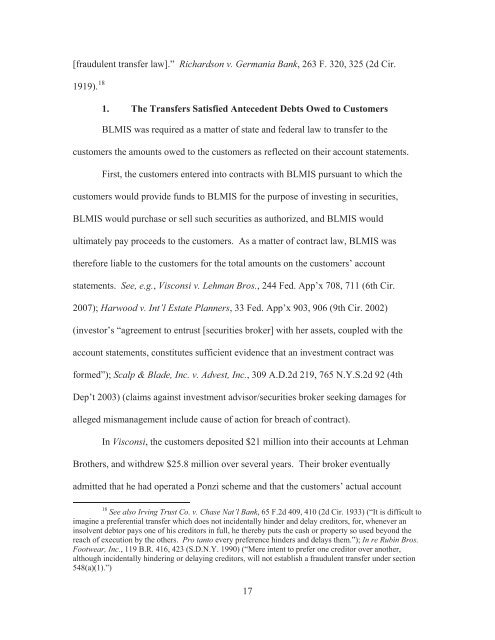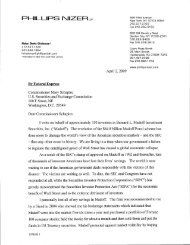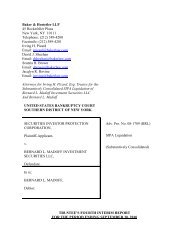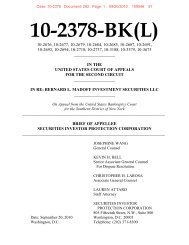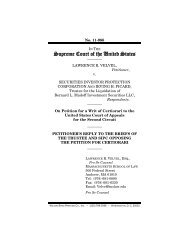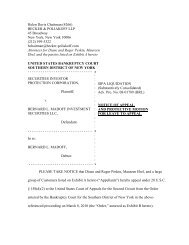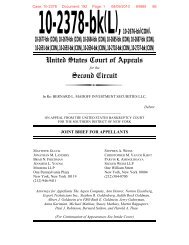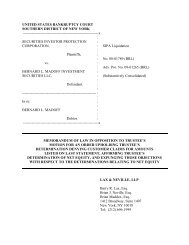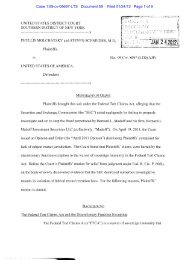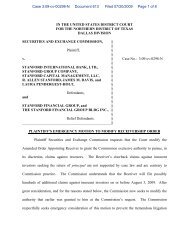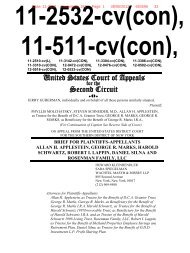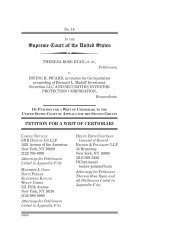Davis Polk & Wardwell LLP 450 Lexington Avenue New York, New ...
Davis Polk & Wardwell LLP 450 Lexington Avenue New York, New ...
Davis Polk & Wardwell LLP 450 Lexington Avenue New York, New ...
Create successful ePaper yourself
Turn your PDF publications into a flip-book with our unique Google optimized e-Paper software.
[fraudulent transfer law].” Richardson v. Germania Bank, 263 F. 320, 325 (2d Cir.<br />
1919). 18 1. The Transfers Satisfied Antecedent Debts Owed to Customers<br />
BLMIS was required as a matter of state and federal law to transfer to the<br />
customers the amounts owed to the customers as reflected on their account statements.<br />
First, the customers entered into contracts with BLMIS pursuant to which the<br />
customers would provide funds to BLMIS for the purpose of investing in securities,<br />
BLMIS would purchase or sell such securities as authorized, and BLMIS would<br />
ultimately pay proceeds to the customers. As a matter of contract law, BLMIS was<br />
therefore liable to the customers for the total amounts on the customers’ account<br />
statements. See, e.g., Visconsi v. Lehman Bros., 244 Fed. App’x 708, 711 (6th Cir.<br />
2007); Harwood v. Int’l Estate Planners, 33 Fed. App’x 903, 906 (9th Cir. 2002)<br />
(investor’s “agreement to entrust [securities broker] with her assets, coupled with the<br />
account statements, constitutes sufficient evidence that an investment contract was<br />
formed”); Scalp & Blade, Inc. v. Advest, Inc., 309 A.D.2d 219, 765 N.Y.S.2d 92 (4th<br />
Dep’t 2003) (claims against investment advisor/securities broker seeking damages for<br />
alleged mismanagement include cause of action for breach of contract).<br />
In Visconsi, the customers deposited $21 million into their accounts at Lehman<br />
Brothers, and withdrew $25.8 million over several years. Their broker eventually<br />
admitted that he had operated a Ponzi scheme and that the customers’ actual account<br />
18 See also Irving Trust Co. v. Chase Nat’l Bank, 65 F.2d 409, 410 (2d Cir. 1933) (“It is difficult to<br />
imagine a preferential transfer which does not incidentally hinder and delay creditors, for, whenever an<br />
insolvent debtor pays one of his creditors in full, he thereby puts the cash or property so used beyond the<br />
reach of execution by the others. Pro tanto every preference hinders and delays them.”); In re Rubin Bros.<br />
Footwear, Inc., 119 B.R. 416, 423 (S.D.N.Y. 1990) (“Mere intent to prefer one creditor over another,<br />
although incidentally hindering or delaying creditors, will not establish a fraudulent transfer under section<br />
548(a)(1).”)<br />
17


